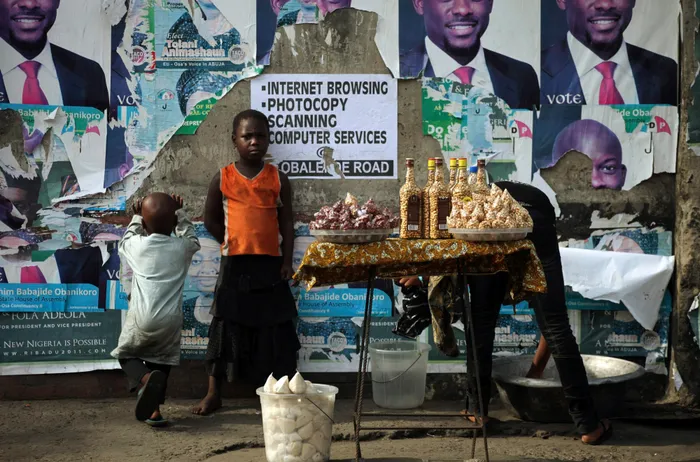Nigerian elections: Role of the African Continental Free Trade Area

Picture: REUTERS/Akintunde Akinleye - In this file picture, children play near defaced election posters in Ebute Meta district in Nigeria's commercial capital Lagos. The country is set to hold elections on February 25.
By David Monyae
Africa’s biggest economy and most populous country, Nigeria, will hold general elections on the 25 th of February which will see the voters elect a new president, senators and members of the House of Representatives. The incumbent President Muhammadu Buhari’s 8-year stay in office is set to come to an end. In his two terms in office, President Buhari has presided over rising inflation which stands at over 21% according to the latest figures, widespread poverty with 4 in 10 people living below the poverty line and high levels of unemployment which 33% of the economically active going jobless.
Unemployment is particularly high among the youth with 42.5% of them being unemployed. Another major area of concern under President Buhari’s reign has been the security situation in Nigeria where terrorist attacks, especially in the country’s northern region, have become more frequent and increasingly deadly perpetrated mainly by the terrorist group, Boko Haram. One of the deadliest attacks occurred in June 2022 when almost 50 people were killed by gunmen whilst attending a church service.
Despite making national security a top priority during his election campaign, President Buhari’s administration has met with limited success in that area. Moreover, corruption has been endemic in Nigeria affecting all levels of government and society in general. Although this is a problem that predated Buhari’s administration, the incumbent did not do much to make things better.
According to Transparency International’s Corruption Index of 2021, Nigeria ranks a lowly 154 out of 180 countries making it one of the top 30 most corrupt countries in the world. Corruption in the country exacerbates poverty and contributes to instability and the exodus of skilled Nigerians who settle in other countries for greener pastures. These and other issues have become part of the main narrative in the ongoing election campaigns by different presidential candidates running for office.
There are a total of 18 candidates who have declared their candidature for the presidential election. However, realistically, only three of them stand a chance of winning. These include Bola Ahmed Tinubu who is running under the ruling All Progressives Congress (APC) ticket, Atiku Abubakar of the main opposition People’s Democratic Party (PDP) and Peter Obi of the newly formed Labour Party who seeks to loosen the stranglehold of the PDP and the APC over the Nigerian electorate.
All the candidates are veterans of the Nigerian political system having served at different levels of government with Mr Tinubu and Mr Obi having previously served as governors in Lagos and Anambra State respectively while Mr Abubakar served as deputy president under former president Olusegun Obasanjo. They will be fighting for the votes of the 93 million Nigerians who have registered to vote.
According to the Nigerian electoral system, the winner should have the highest number of votes with at least 25 percent of the votes in 75% of the states.
If there is no outright winner, the elections will go to the second round to be contested between the top two candidates. According to a number of polls that have been conducted to measure to ascertain the distribution of support for the leading presidential candidates, Peter Obi of the Labour Party seems to have an edge over the other two candidates. In one of the polls, 23 percent of the participants said they would vote for Mr Obi while 13 percent expressed support for Mr Tinubu and 10% for Mr Abubakar. However, the polls have thus far failed to project an outright winner making a second round highly likely.
Mr Obi, the youngest of the leading candidates at 62, has enjoying massive support from the young people who make up 40 percent of the registered voters. His campaign has been able to take advantage of social media to mobilize the country’s youth behind his candidacy. However, there have been fears that the elections may be postponed because of the tense security situation.
Between 2019 and 2022, the country recorded about 50 separate attacks on the offices of the electoral commission suspected to be perpetrated by Boko Haram and other armed groups. Thus far, the government has not been able to guarantee the voters and election officials’ security during the election process. If left un-addressed, the poor security situation will harm the integrity of the election and compromise its outcome plunging Africa’s biggest economy into the risk of political instability. Nigeria’s elections will have significant implications beyond its borders.
The West Africa is a regional powerhouse in Africa enjoying a hegemonic status.
The manner in which it conducts its elections will have an impact on the election and democratic standards in other countries on the continent. Hence, it is important for Nigeria to lead by example and be the democratic torch-bearer in Africa. Further, the outcome of the elections will also determine Nigeria’s domestic and foreign policies.
This election comes as the continent is trying to implement programmes such as the African Continental Free Trade Area (AfCFTA). The fate of such initiatives will hinge to a considerable degree on the leadership or lack of it of the Nigerian government.
- Prof David Monyae is Associate Professor of International Relations and Political Science and Director of the Centre for Africa-China Studies at the University of Johannesburg.
This article is exclusive to The African. To republish, see terms and conditions.